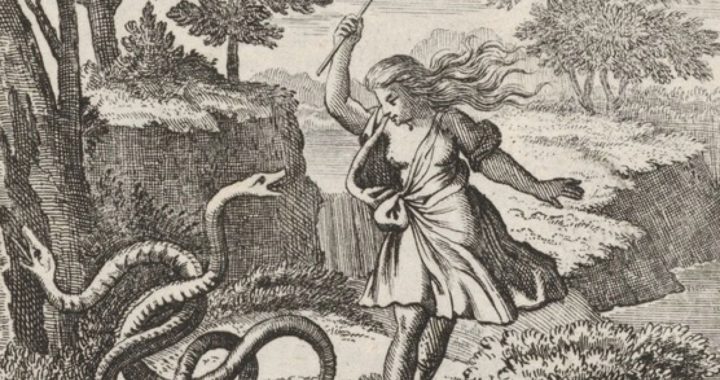I open at random one of my favorite books of Nonfiction, Gloria Anzaldúa’s Borderlands.
Page 41:
Half and Half
There was a muchacha who lived near my house. La gente del pueblo talked about her being una de las ortras, “of the Others.” They said that for six months she was a woman who had a vagina that bled once a month, and that for the other six months she was a man, had a penis and she peed standing up. They called her half and half, mita’ y mita’, neither one nor the other but a strange doubling, a deviation of nature that horrified, a work of nature inverted. But there is a magic aspect in abnormality and so-called deformity. Maimed, mad, and sexually different people were believed to posses supernatural powers by primal cultures’ magico-religious thinking. For them, abnormality was the price a person had to pay for her or his inborn extraordinary gift.
There is something compelling about being both male and female, about having an entry into both worlds. Contrary to some psychiatric tenets, half and halfs are not suffering from a confusion of sexual identity, or even from a confusion of gender. What we are suffering from is an absolute despot duality that says we are ale to be only one or the other. It claims that human nature is limited and cannot evolve into something better. But I, like other queer people, am two in one body, both male and female. I am the embodiment of the hieros gamos: the coming together of opposite qualities within. [bold, mine]
The Hieros Gamos
Googling this curious concept, one discovers its origin reaches as far back as the fertility rituals of the Ancient Near East, where god and goddess merged, usually in marriage, but just as often in sexual union. So, pretty old stuff, this sacred coming together. (Pun intended.)
But the more curious part is how Anzaldúa takes this concept to conceive of herself as partaking of the sacred ritual. She represents it. She “embodies” it. Furthers it.
In this particular case, as a queer person who is both male and female.
But hold on a minute! How could that be? One does not need to be a hyper-rationalist to realize the author using poetic license (in this case, the borrowing of high-concept to express interiority). She cannot be both male and female, anymore than the muchacha cited in the opening paragraph had a vagina for six months and a penis the other six months. Rather, this is the blending of folklore with superstition. Throw Anzaldúa into the mix, and you get Greek mythology, queer theory, and Jung. For a saucy, but not quite nonfiction, read.
What is Fiction?
There’s nothing wrong with expression your soul through poetic means, pulling from theories, from folklore, from any ingredient close at hand. But this we call fiction.
How is this fictionalization of the self acceptable in an autobiographic book? (This is the question this post explores.)
When I opened Borderlands today, I was actually looking for the lines where Anzaldúa calls herself a serpent, an eagle, both the serpent and the eagle on the Mexican flag. It blew my mind just how bold she could be in a book that, seemingly, blends cold fact with hot mystic experience. It must be a lie at worst, a scatological revelation at best? But, no, no, that would be unfair to the authorial intent: Anzaldúa does see herself as two conflicting animals, does see herself as two congruent genders, just as much as she sees herself as “embodying” two contrasting cultures on opposite sides of the Rio Grande.
Blur all lines, watch what happens: Anzaldúa’s thesis.
Globally, why not call it all fiction, then, or better: why don’t we label her a medieval mystic, and move on? I’m not saying we burn her at the stake, or that we have a bonfire with her books. NO!
I hold her up as the Rumi of the 80s. Or in still higher esteem. Like a workshop professor put it the other day, “We don’t even have the language yet to explain what Anzaldúa was doing.” And I couldn’t agree more. If this be true, by the way, then I have my doctoral thesis locked and loaded.
“Fiction is more real than nonfiction.” I heard Jordan Peterson put it this way in a talk recently, though he was citing other authors who believed the same. Hemingway, in his Nobel Prize Speech, puts it similarly.
If you’re wondering, “How can a lie be more real than reality?” Look at it this way, FICTION isn’t necessarily a lie. (Saying “I have your money, give me a day to get it to you,” is a lie, if you don’t; while saying “I always pay you back, give me a day to get it to you,” is a fiction, because it reaches for a higher plane. Let me explain . . .)
Imagine you chronicle the lives of ten people from birth until death. Strictly the facts. We could call that Nonfiction.
Yet, suppose a young buck came along, read all then of those chronicles, and decided to write an amalgam story. That is one story, of roughly the average length of the ten stories. Which takes only the most essential parts of those ten stories.
Maybe one chronicle is about a lawyer, another about a doctor, yet another about a thief. But what do those three have in common? (Notice the present tense, analyzing the stories of the past.)
The fictional character 11th would still be born. Would still die. Would still fall in love. These are the universal ingredients of all man. They transcend, just as they instantiate. Thus, the fictional 11th story would be more real than real, because it would rise above reality, into meta-reality, as it detailed the truth in all ten chronicles.
Is it any wonder we find ourselves in the ancient Greek myths? Who hasn’t chased a girl who didn’t love us, only for her to turn into a tree. Who hasn’t disobeyed a father, only to crash and burn. Who hasn’t slept with his mother, only to regret it?
Granted, that last one doesn’t necessarily happen all the time. And yet I did ask my mother to marry me once — I was five, ffs! — and Freud boils people’s blood to this day, love him or hate him.
The Anzaldúa piece, about the muchacha, it makes me lol.
Do you remember the blind man who forsaw Oedipus’s fall? It was old Tiresias.
This guy, famed for his clairvoyant prowess, was actually transformed into a woman. For seven years Tiresias was female, until being turned back into male. (Funny sidebar: Hera, Zeus, and all the gods were drunkenly debating who had the stronger orgasms, men or women. They invite Tiresias to Olympus, to settle the matter, asking him, Since you were both a man and a woman, which one has the stronger orgasms? Tiresias, once again a man, sighs, saying, Women, women have the better orgasms.)
So, first, Anzaldúa isn’t too far out for seeing herself as the reiteration of man’s dual-gendered clairvoyant. There is mythological precedent for it. BUT C’MON, CAN WE HONESTLY, TRUTHFULLY, and FAITHFULLY shelve the book Borderlands in nonfiction?
I don’t know. My instinct says, No. Yet we have to make room for it in our libraries, or else its ambition will end up on a backroom coffee table, collecting dust and mug stains. If this book cannot be categorized, then why stop there. Burn all genres. Blur all lines. Blow Chaos and penetrate Gaia in a cosmic ménage à trois.
As we drain the marshes of Borderlands, why not entertain ourselves with an experiment? Watch, I’ll write six nonfiction sentences, and one of fiction last. Next I’ll turn the non-fiction into fiction sentences. Until there’s six fiction sentences and one nonfiction. Just to see what happens.
If you don’t believe in any difference, then every paragraph will be equal. Or, if there is a difference between fiction and nonfiction, then tell me, which paragraph is most real?
What is Nonfiction?
This morning as every morning, I prepared myself a glass of yerba mate. Some call it the drink of the gods. And that must be because of all the mate-ina in it, energizing you. The smell reminds me of urban sunsets and heavy traffic, since I used to drink a liter’s worth every afternoon in Buenos Aires. But my favorite part is the taste. This bitter, earthy blast of flavor, tantalizing the palate. Forwarding the drinker into the future.
This morning as every morning, I prepared myself a glass of yerba mate. Some call it the drink of the gods. And that must be because of all the mate-ina in it, energizing you. The smell reminds me of urban sunsets and heavy traffic, since I used to drink a liter’s worth every afternoon in Buenos Aires. But my favorite part is the taste. Of life’s bitterness passing through. Forwarding the drinker into the future.
This morning as every morning, I prepared myself a glass of yerba mate. Some call it the drink of the gods. And that must be because of all the mate-ina in it, energizing you. The smell reminds me of urban sunsets and heavy traffic, since I used to drink a liter’s worth every afternoon in Buenos Aires. But the best part is the taste. Of life’s bitterness passing through. Forwarding the drinker into the future.
This morning as every morning, I prepared myself a glass of yerba mate. Some call it the drink of the gods. And that must be because of all the mate-ina in it, energizing you. The smell of urban sunsets and heavy traffic, folks racing home. But the best part is the taste. Of life’s bitterness passing through. Forwarding the drinker into the future.
This morning as every morning, I prepared myself a glass of yerba mate. Some call it the drink of the gods. And that must be because it is, grown from the earth, as is, for you. The smell of urban sunsets and heavy traffic, folks racing home. But the best part is the taste. Of life’s bitterness passing through. Forwarding the drinker into the future.
This morning as every morning, I prepared myself a glass of yerba mate. The drink of the gods, they say. And that must be because it is, grown from the earth, as is, for you. The smell of urban sunsets and heavy traffic, folks racing home. But the best part is the taste. Of life’s bitterness passing through. Forwarding the drinker into the future.




